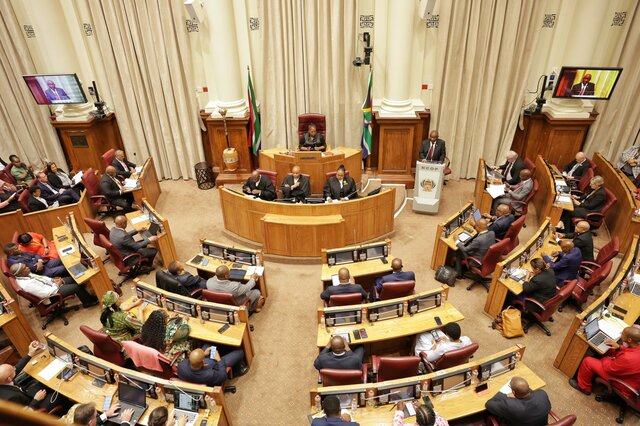Cape Town — President Cyril Ramaphosa has acknowledged the ongoing poverty challenges facing South Africans, despite the country’s progress since the end of apartheid.
Speaking during his annual address to the National Council of Provinces (NCOP) on Thursday, Ramaphosa highlighted the Government of National Unity’s commitment to addressing poverty and the high cost of living, emphasising the importance of building a capable, ethical, and developmental state.
“The decision by the NCOP to dedicate this debate to focus on our collective efforts to reduce poverty and tackle the high cost of living is a worthy and timely response to the mandate of the people,” he said.
“The decision by the NCOP to dedicate this debate to focus on our collective efforts to reduce poverty and tackle the high cost of living is a worthy and timely response to the mandate of the people”#7thParliament#30YearsofDemocraticParliament #AnnualAddresstoNCOP pic.twitter.com/3T8b9daH1R
— Parliament of RSA (@ParliamentofRSA) November 28, 2024
He said that the preamble of the Constitution emphasised the commitment to heal each person and improve the quality of life for all citizens.
“The end of poverty and inequality in South Africa therefore requires nothing less than the fundamental social and economic transformation of our country,” he said,
While progress has been made in the past 30 years, many challenges have risen globally and in South Africa.
“These include state capture and corruption, policy missteps, service delivery failures and civil unrest. As we work to put these challenges behind us, our focus is on the actions we must take – boldly and with urgency – to implement our electoral mandate,” he said,
He said it was important to reduce poverty and inequality by building an inclusive economy.
“As we work to rebuild the economy, to create more employment and open opportunities for emerging businesses, we continue to assist the poorest and most vulnerable in our society. We provide various forms of support and protection through the ‘social wage’.” he said.
Ramaphosa said this was possible through social grants, free basic services, health care, basic education, higher education, social housing and transport.
“While there will always be people who need support – such as the elderly, children and persons with disabilities – our aim must be to steadily move as many social grant recipients as possible into sustainable livelihoods,” he said.
“The funds we spend on social support and protection are not wasted. They make a real difference in people’s lives and improve their prospects for a better future.” @CyrilRamaphosa #7thParliament#30YearsofDemocraticParliament#AnnualAddresstoNCOP pic.twitter.com/5QPbBNDBBz
— Parliament of RSA (@ParliamentofRSA) November 28, 2024
Additional points of concern included access to food, and transport, reducing electricity costs, improving healthcare through the National Health Insurance (NHI) Bill, and accessible and affordable education to all.
Ramaphosa said unemployment remains a big issue in South Africa, as without any job creation, there is no growth.
“We are pursuing far-reaching economic reforms to make the economy more competitive and to enable greater growth. There is now significant momentum to our reforms in strategic network industries like electricity, water, telecommunications, rail and ports,” he said.
The problem of unemployment is most severe among young people. To address this, the government established the SAYouth.mobi platform for young people to find opportunities for employment, training and development.
To unlock growth in informal employment, the government is working to ease restrictions on informal trading, reduce the cost of trading and expand lending to small businesses by providing guarantees and first-loss funding.
He added that South Africa would use its Presidency of the G20 Summit to focus on the theme of ‘Solidarity, Equality and Sustainability’.
“We will call on the members of the G20 to stand in solidarity with those people who are facing hardship, poverty and conflict. We will work to tackle inequality through fair and consistent trade rules, improved debt relief mechanisms, and increased funding for climate actions and development,” he said.
“Poverty, unemployment and inequality are so pervasive and so persistent that we sometimes fear we may never overcome them. And yet, we overcame apartheid. We overcame slavery and colonialism. Through our collective actions, we will be able to end poverty in our country,” he concluded.
Follow African Insider on Facebook, Twitter and Instagram
Picture: X/@PresidencyZA
For more African news, visit Africaninsider.com
Compiled by Matthew Petersen


